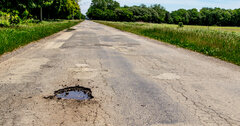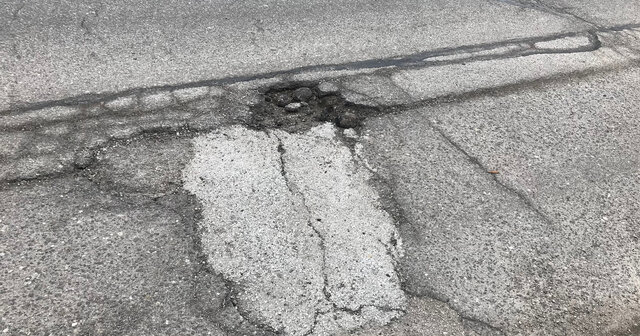

Michigan’s roads will continue to fall apart faster than the state will repair them, according to the latest projections. The Transportation Asset Management Council’s annual Roads and Bridges report includes a forecast for pavement quality, which the report says will decline over the next decade. While 68% of roads are in good or fair condition now, the report expects that number to drop to 54%.
The report also shows that roads are in better shape than they used to be. Only 61% of roads were in good or fair condition in 2015.
(Note that these are estimates for major roads in the state, not all roads.)
Roads are in better shape in part because lawmakers spend more money on roads. They spent $2.0 billion of state tax money on transportation in fiscal year 2010-11. Funding increased to $3.6 billion in FY 2018-19, a 62% increase when adjusted for inflation. Roughly $600 million of that extra spending came from a fuel and vehicle registration tax hike enacted in 2015.
People got something in return for the increased spending on roads. They avoided the large declines in road quality that were expected in 2011. And by 2019, extra spending was sufficient to fix roads at roughly the same rate they deteriorated.
This is no longer the case. State funding has been stagnant under Gov. Gretchen Whitmer. In her first term she recommended a $2.5 billion tax hike to cover $1.9 billion in increased road spending. Republican legislators countered by redirecting $400 million in the budget for roads. Whitmer vetoed the redirection, and state road budgets have not kept up with inflation since.
Michigan roads have, though, received some extra funding in recent years. The federal government gave the state more money for road maintenance. Whitmer borrowed money to spend on road repair. The bonds are paid off with money from taxes the state earmarks to roads. The debt increased road quality over the short term but harmed long-term road funding since it costs taxpayers interest that would otherwise be used for road repair. The extra debt takes the state further from the point where it fixes roads faster than they fall apart.
There is another plan to spend more on roads, however. Michigan House members approved legislation that redirects money away from the state’s business subsidy programs and toward roads. The package also earmarks the revenue from the state’s corporate income tax to road repair. It would give the state more than enough to improve road quality over the long term.
Lawmakers may agree on this plan or on another one. Or they may defer the question even further, as they have done since Whitmer took office. There has been less road funding with this governor, and her road bonds have only ensured that the state has less money over the long term to repair roads.
Permission to reprint this blog post in whole or in part is hereby granted, provided that the author (or authors) and the Mackinac Center for Public Policy are properly cited.
Get insightful commentary and the most reliable research on Michigan issues sent straight to your inbox.

The Mackinac Center for Public Policy is a nonprofit research and educational institute that advances the principles of free markets and limited government. Through our research and education programs, we challenge government overreach and advocate for a free-market approach to public policy that frees people to realize their potential and dreams.
Please consider contributing to our work to advance a freer and more prosperous state.

Donate | About | Blog | Pressroom | Publications | Careers | Site Map | Email Signup | Contact